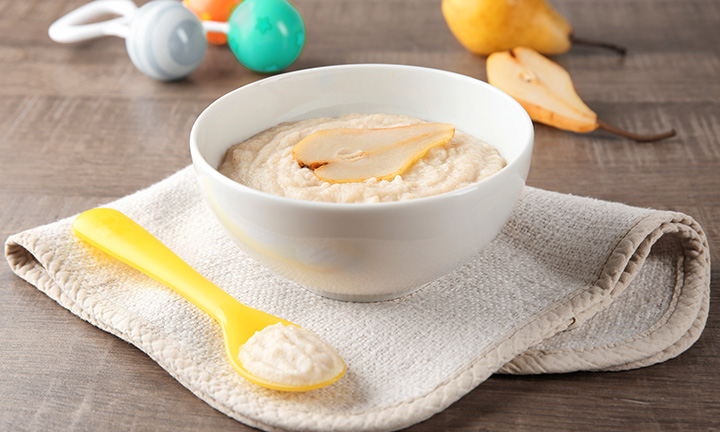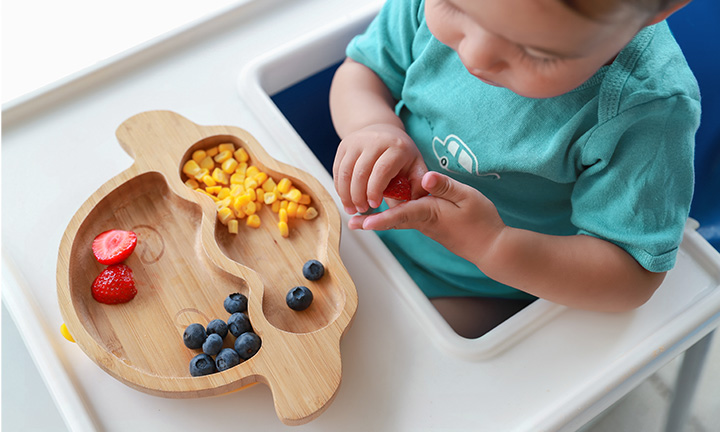
Food Allergies in Babies
At around 6 months old, your baby is ready to begin eating solid food—what a wonderful new journey for both of you. As your baby experiences a whole new world of flavors and textures, you may notice there are certain foods she reacts to differently—and we don't mean spitting out the pureed spinach! In certain cases, she may be reacting to a food allergy. Read on to learn what exactly a food allergy is, what some common food allergies are, and what to do if your baby has an allergic reaction.
What Are Food Allergies?
An allergy is the immune system's response to something it doesn't like. For example, some people are allergic to dust or pollen and get itchy eyes or a runny nose when exposed to these allergens. With food allergies, most people react with digestive problems, hives, or breathing problems.
The human body treats allergens as invaders and produces antibodies to try to fight off the invasion. Once these antibodies enter the bloodstream, the body reacts—hence the term "allergic reaction," which you can read about more here.
Thankfully, food allergies are rare in children, with fewer than 8 percent of those under the age of 3 having them. Many of these children also outgrow their food allergies over time.
Still, because the body’s reaction can be severe if your baby does indeed have a food allergy, it’s important to know what an allergic reaction can look like and what to do if you suspect your baby has a food allergy.
Signs and Symptoms to Look Out For
Food allergies can be more serious than seasonal allergies because the body’s reaction can be more severe.
Here are some of the signs and symptoms of a food allergy in a baby or toddler:
Notify your child's healthcare provider if you see any of these symptoms. If multiple symptoms happen quickly at the same time after your baby or toddler has eaten a food, she may be having an anaphylactic reaction (a very serious allergic reaction that comes on quickly), which is life-threatening. Seek immediate medical attention by calling 911.
Common Foods That Cause Allergic Reactions
So what are the most common food allergens? Here's a list of foods that often trigger an allergy in your baby or toddler:
As you can see, there is a bright side to some of this: Many children outgrow their food allergies, with an estimated 80 to 90 percent of children growing out of their allergies to milk, eggs, wheat, and soy by the time they are 5 years old. And, one in five children will probably outgrow peanut allergies.
Speak to your baby's healthcare provider if you have any questions about your little one's food allergy.
What's the Difference Between a Food Allergy and a Food Intolerance?
Sometimes children aren't allergic to a certain food, but instead have an intolerance for it. Intolerance of certain foods (basically an inability to digest the food) is less serious than a food allergy (which can result in a very serious allergic reaction) but it's still an uncomfortable problem.
Here are two common food intolerances:
How Are Food Allergies Diagnosed?
If you suspect your baby has an allergy or intolerance, consult her healthcare provider. It's not a good idea to try to make your own diagnosis. The healthcare provider may use any of the following to diagnose a food allergy:
What to Do If Your Baby Has Been Diagnosed With a Food Allergy
If your baby or toddler is diagnosed with a food allergy, it's best to begin avoiding that specific food immediately, even if her allergic reaction isn't a serious one. You'll need to be very mindful of what foods your baby or toddler is going to eat at all times, especially if it's food you didn't prepare.
Check Ingredient Labels
Be aware that many store-bought foods contain traces of allergens (the most common ones in packaged foods are tree nuts, peanuts, soy, and wheat), so you will need to start reading all product labels to make sure you aren't accidentally giving your baby or toddler something he may have an allergic reaction to.
It's also a good idea to make sure your pantry doesn't contain any foods that have traces of the allergen, because you never know when your curious toddler may get into something he shouldn't be eating.
In time, when your child is old enough to understand, you'll want to teach him about his food allergy.
Pay Attention to Your Infant's Reactions
If you're still in the breastfeeding stage, you may want to avoid certain foods if you see your infant having a bad allergic reaction like skin rashes or loose stools. But check with his healthcare provider first before making any sweeping dietary changes.
Similarly, if you're formula-feeding, you will want to pay attention the list of ingredients on the formula label if you see your infant experiencing rashes or loose stools. He may be allergic to one of the ingredients. Check with his provider, who may recommend switching to a hypoallergenic formula.
Of course, you'll need to watch carefully for signs of food allergies as you transition to feeding your little one solid foods.
Precautions to Take With Serious Food Allergies
If your child's healthcare provider has diagnosed a serious food allergy that results in life-threatening anaphylaxis, he will prescribe a special epinephrine auto-injector. Epinephrine is a life-saving drug that works quickly to stop swelling of the airways.
You’ll need to learn how to use the device so that you can inject it immediately in case your little one experiences an anaphylactic reaction.
Keep a number of these devices handy, perhaps keeping one in your car and one at home in your first-aid kit or medicine cabinet. If your baby goes to daycare, make sure the staff has one as well.
You’ll also need to make sure everyone who cares for your little one (including grandparents and babysitters) knows how to use the injector, and you'll need to remember to replace the injectors when they expire.
Caregivers, daycare staff, preschool teachers, and friends and family members who care for your baby or toddler should all be aware of his allergies and know what to do if an anaphylactic reaction occurs.
FREQUENTLY ASKED QUESTIONS
- Cow's milk
- Eggs
- Tree nuts
- Peanuts
- Soy
- Wheat
- Fish
- Shellfish.
If your baby or toddler is diagnosed with a food allergy, it may mean avoiding that food altogether, and making sure that everyone around him is prepared for the possibility of immediate action if he has a severe allergic reaction.
Luckily, many food allergies are outgrown by school age, and those that aren’t can be managed by being extra vigilant of what your little one eats or has access to. If you need help with how to manage your child’s food allergy or have any other questions, don't be afraid to turn to his healthcare provider for guidance.
- Mayo Clinic: Food Allergy
- Healthy Children: Food Allergies in Children
- Kidshealth: Allergy
- Kidshealth: Allergy Intolerance
- Healthy Children: Anaphylaxis
- Healthychildren: How to Use an Epinephrine Auto Injector
- Healthy Children: Lactose Intolerance in Children
- Kidshealth: Celiac
- Cleveland Clinic: Soy Allergy
- Healthy Children: Allergies and Food Sensitivities
- Healthy Children. Food Allergies in Children: Common Causes & Symptoms
- Book: Caring for your baby and young child birth to age 5, Sixth Edition Paperback – November 2, 2014 by American Academy of Pediatrics (Author)
Read more about Baby
Related Articles
Join a World of Support
through Pregnancy and Parenthood.
TRACK WITH TOOLS
LEARN WITH EXPERTS
GET REWARDED










